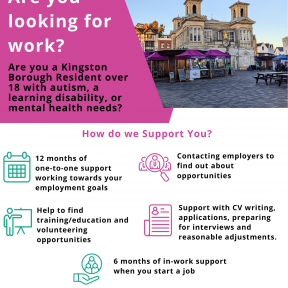Supported employment is about supporting people with a wide range of disabilities or learning difficulties find and maintain employment. It’s person led meaning our Employment Support Workers follow our clients lead on what they want out of Employment. This approach has been proven to be better suited in supporting a more diverse range of people including those with learning disabilities, autism and other needs on their Employment Journey. It also has a focus on creating strong working links between Employment Support Workers, Employers and potential Employees to offer assurance and support every step of the way.
Supported Employment has five phases which are there to support both Employment Support Workers and the people coming to use the service on what they need from the model.
Phase 1: Engaging jobseekers
Supported Employment is about ensuring that anyone looking for support into Employment is aware that services such as us exist. To find out more about our Supported Employment service please visit our Working Well Trust Kingston page located here We also create a range of publicity materials including leaflets to ensure people can find where we are and get in touch for support.


Phase 2: Vocational profiling and action planning
Once referred and that first meeting booked in the Employment Support Worker sits down with the client to get to know one another, discuss goals and expectations before agreeing on how you will proceed. This discussion is client lead and results in the creation of both a Vocational profile detailing what the client wishes to get out of the service and an Action Plan to work on the best way to make this happen.
Phase 3: Employer Engagement
Employer Engagement of EE is about going out into the community and meeting Employers to see the best way of supporting their clients into Employment. This can be done in person, on the phone or online but regardless it’s still with the same result in mind. Building stronger working links with Employers to support people into work. You can find out more about how we approach Employer Engagement here


Phase 4: Job matching and securing employment
Working with clients the Employment Support Worker now supports them to apply for the roles they’re after. Thanks to Employer Engagement the client knows of the job vacancies out there but will still need to apply. They need to consider if their CV is up to date, if they need any reasonable adjustments for an interview or even if they need to practise a job interview to help them secure the role.
Phase 5: In-work support and career development
With the role secure the Employment Support Worker now works with both their client and the Employer to ensure their newest member of staff is fully supported in the job. This might cover reasonable adjustments, securing of additional equipment to help them in their day to day tasks or offering career advice to make sure they flourish in their role. The Employment Support Worker isn’t just there to help the client get the result they want but to make sure they keep it too.

Find Out More
Supported Employment is employed across the country supporting people from all walks of life find the job they want. To find out more about this form of employment support you can visit the website for the British Association of Supported Employment (BASE) here